#desire character analysis
Text
OK correct me if I'm wrong, but I feel like the main 'yin/yang' parallel with Atsushi and Akutagawa is not something like 'this one is bad but secretly has a good side and this one is good but secretly has a bad side'.
I feel like it's more about 'who they are at their core vs who they choose to be'.
At his core Akutagawa is kind and at his core Atsushi is not. But despite this Atsushi tries every day to make the kinder choices and I love him so much for it. He has to work so hard to be good.
He wants to be a bitch SO bad I know he does but he tries his best to help people and be nice (sometimes he fails but that's OK <3)
Atsushi doesn't always WANT to help people, a lot of the time he's selfish and scared, but he does help people anyway. He keeps helping people over and over again. There's still some selfish motivation to it, and his initial motivation for helping people was because the headmaster told him that's all he was worth, but overall he does care about the people he helps and it weighs on him if he fails to save them. And of course, as the series goes on he starts helping people more because he can rather than because he feels like he needs to.
In Akutagawa's case, he's still capable of being kind but his environment led him into being someone who chooses to hurt people. But he's always been a protector at heart. In the start he was bad compared to Atsushi because he was choosing to hurt people and keep the cycle of abuse going. Just like how Atsushi developed in why he saved people, Akutagawa starts to get redeemed when he chooses to not just act on his rage. Not only does he start to spare people, but he speaks more kindly to them (apologising to Higuchi and telling Kyouka he's proud of her). It all culminates into the moment he chooses to help Atsushi and sacrifice himself for him, going back to his core value of being a protector. Even when he's finally revived, he keeps this role in his new position as Aya's Knight.
I kind of see the streaks of white in Akutagawa and the streaks of black in Atsushi not as their 'hidden sides' but as their fundamental selfs. That's who they are at their core, and their main colours (black for Akutagawa and white for Atsushi) are how they're presented to everyone else and how they try to have people see them as.
#I'm just spitballing half of this but these are also my genuine thoughts on these two and their yin/yang parallels#I'll never get over Akutagawa being a protector at heart and getting that side of him buried with rage from growing up in the PM and-#-Dazai's old teachings#also Atsushi being selfish at his core is very important to me. He's not a typical 'kind hearted' shonen protagonist. He's kind not because#-that's how he’s always been but because that's how he chooses to be#I think that kind of character is even more admirable to me#it also fits well with Dazai being his mentor. Since Dazai also doesn't have that initial desire to save people just out of kindness.#He saves people as a promise to his dead friend that wanted him to live a good life#in fact that actually fits with Jouno too#now that I think about it quite a few bsd characters fit into that 'not kind because they were born that way but because they chose to be'-#-archetype#hell yeah. That's kinda cool I like that#bsd analysis#Akutagawa#atsushi#akutagawa ryuunosuke#atsushi nakajima#sskk#shin soukoku#<- Not a ship post but adding this tag since I consider that their duo name too#bsd#bungou stray dogs#bungobble my post
732 notes
·
View notes
Text
Only Hope (!) calls you out like that…
Since I’m currently in the process of writing the mother of all “H/hope in the Sandman”-metas, just a couple of random panels about Hope, Dream and Desire. This one, obviously everyone talks about quite often…

And this is doubly important since this happens after a certain 1889 meeting, but before the fishbowl. So Dream didn’t have the experience of being captured yet that furthered his change. And yet, his reaction to her is very different than the reaction to Hob (also: Can we talk about the symbolism in Hope reaching out her hand, touching him and his allowing it?). Because she is Hope.
(And innocence I dare say—she is a child for a reason.)
But the panel hardly anyone ever talks about is this one:
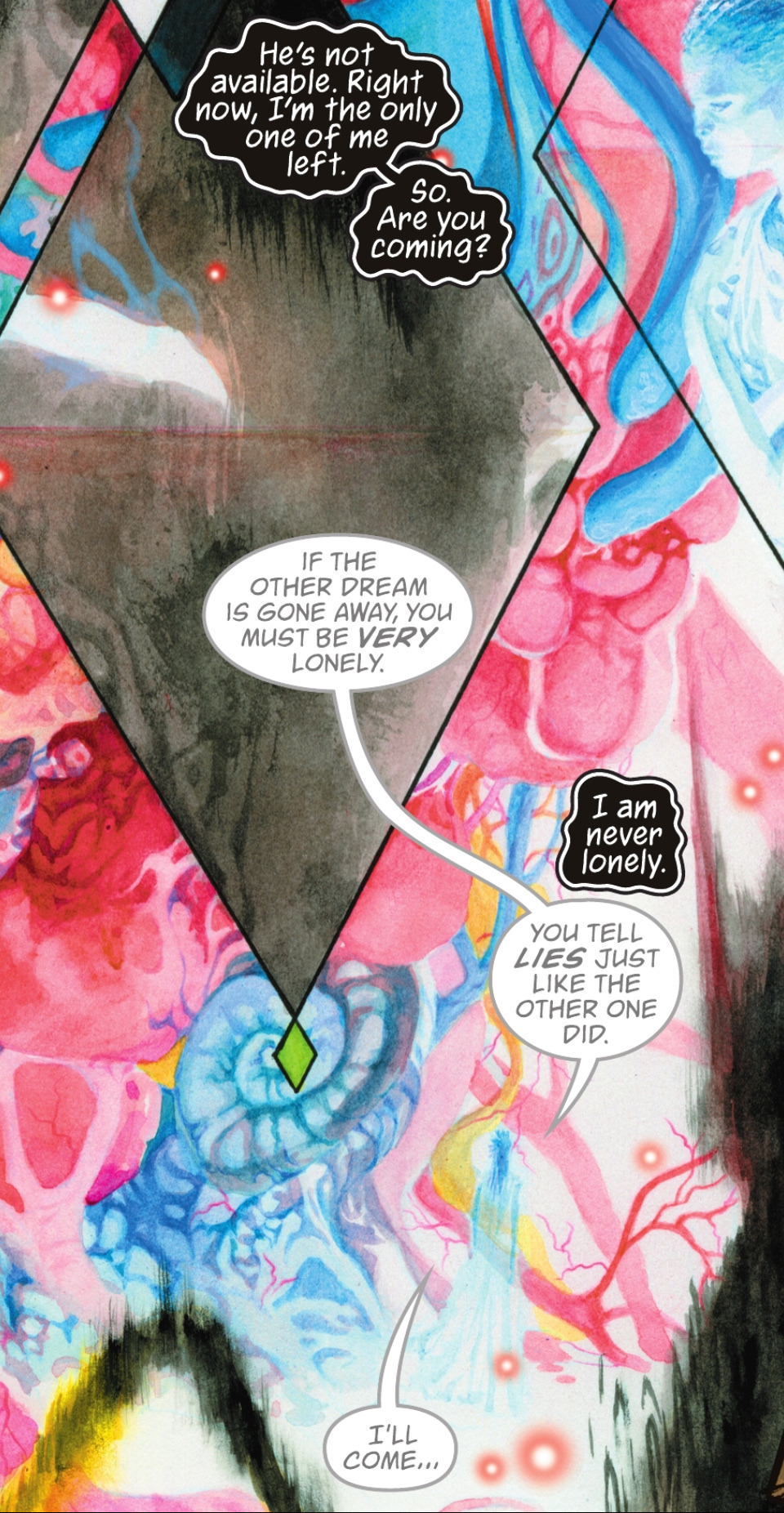
That’s Hope saying the exact same thing to Desire. And they have the same reaction. And she calls them out on their bullshit in exactly the same way. (And again, can we talk about the symbolism in asking Hope to join you and her replying she will come with you? That’s more than just the obvious “We’re saving the universe and you stand for the afterlife”, which is also a biggie, but that’s for the other meta). Because she is Hope.
Both Dream and Desire are so lonely (I’d hazard a guess she could say this to all the Endless btw). And they both cope with it in such maladjusted ways. But they let a child call them out like no one else is allowed to call them out. They bristle, but they don’t overreact like they do with others (especially Dream). Because she is Hope.
(And all of that’s to say: She is the personification of H/hope, not any of the other side-characters that commonly get hope projected on them. And D/dream(s) are hopes and always will be because she touches/d them.)
#the sandman#sandman#dream of the endless#desire of the endless#morpheus#the sandman comics#hope beautiful lost nebula#sandman overture#overture sandman#sandman spoilers#sandman meta#sandman analysis#sandman character analysis#sandman bookclub#queue crew
372 notes
·
View notes
Text
One of the best things about Disco Elysium by far is that it does not fear ugly women. The world is full of ugly men, but ugly women are so hard to come by.
#I'm not calling the characters ugly btw#i don't believe any one can be ugly#i do not care for beauty standards and thus i don't rank people based on how “ugly” or “pretty” they are#but the characters in DE do not meet the conventional beauty standards and look like actual people with unique faces#and thus would be considered “ugly”#and that is so important to me. i go feral whenever media represents how people look like in real life and not how they look like in the#fictional parallel universe where everyone is a model and where a majority of the movies take place#because irl you don't have to be a model to be desirable#the most attractive man in any video game I've ever played has a receding hairline and a big nose and thick glasses and a small chin#and not only is representing realistic people. just good. in general. but it makes the character of Dolores Dei stand out so much more which#works for the game so well. she's barely human. she's a deity- a myth- a legend. the only version that exists of her now is the one with#glowing lungs. she's perfectly beautiful because she's inhuman. the fact that everybody else looks so human only highlights how inhuman she#has become yk?#if everyone was as conventionally attractive as her then she wouldn't stand out. we wouldn't get why she's so special.#disco elysium#disco elysium analysis#media analysis#beauty standards#this is only one aspect of how this game portrays real people btw. as someone interested in character design this just immediately stood out#to me#the first time i noticed it was when i first met garte and the second time was when i met ruby because neither are conventionally desirable#oh my fucking god the nerds who complain about a woman with a model face having body hair in a video game would perish if they played this#mainstream game/movie studios catering to western masses could never
313 notes
·
View notes
Text
my most underrated Kataang take is, I think, the inclusion of Katara's epiphany in The Fortune Teller at all. We've talked ourselves hoarse about how it's the clear turning point in how she consciously thinks of Aang (I will always mandate that she was just unknowingly down bad since the pilot because Look at her behaviour dear god) and how it's important that she has this epiphany even after knowing Aunt Wu's predictions 'aren't real' or necessarily set in stone.
What I want to talk about is why I think it's important that THIS is the moment she sees Aang in a new light amid his previous attempts to have her think of him 'differently' than she did at the beginning of the episode.
When Aang is being sweet to her (making her a woven accidental-betrothal necklace that she happily accepts), Katara is appreciative and responsive, but still says "he's just a good friend, a sweet little guy, just like Momo".
When Aang tries to flirt with her under Sokka's aloof guise, it falls flat. When he tries to get her attention in general (and when having parallels with Meng), it likewise doesn't work.
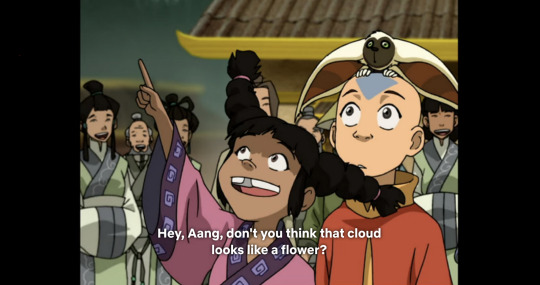
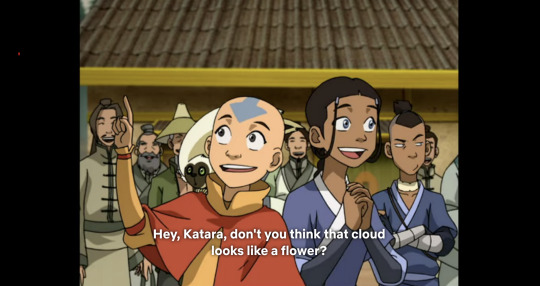
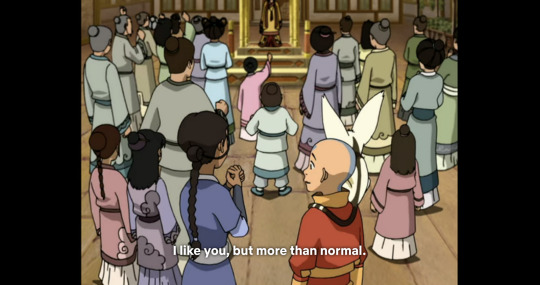
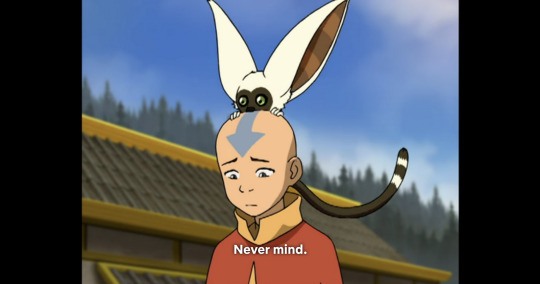
Finally, he tries the flower but it falls into the lava (symoblism, anyone?) and they have bigger things to deal with, like making sure the town isn't completely wiped out by the volcano. It's also worth noting that after Aang's conversation with Meng:
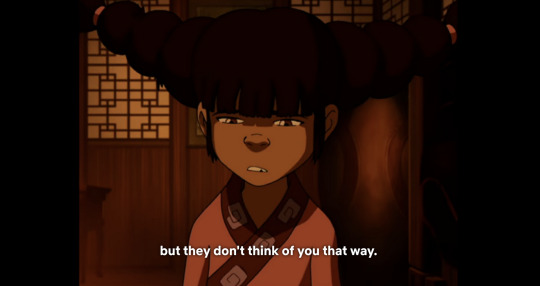
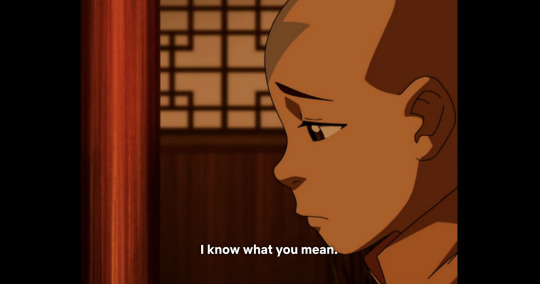
He never actively tries pursuing or wooing Katara in the same way. He's still kind towards and supportive toward her, of course. He, at some point (probably after the 2nd cheek or third cheek kiss) eventually starts to think (understandably) that Katara has feelings for him. But as of The Fortune Teller, he's stopped trying to have her see him in a new light or do a big romantic gesture.
And that's exactly when she does, consciously, fall for him.
Not when he's trying to woo her in failed, false personas, not when he's being his sweet romantic self, but when he's being the most himself all episode: Aang, "the bravest person [she] knows, who's done nothing but help people and save lives" since she met him (1x12).
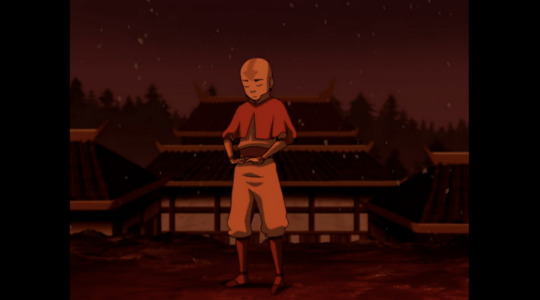
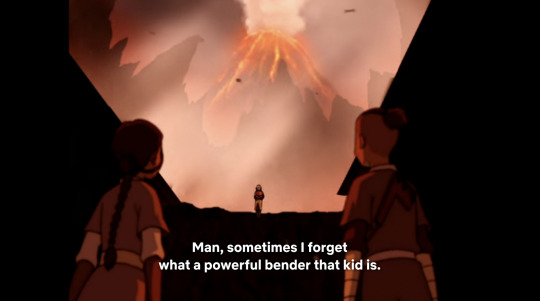
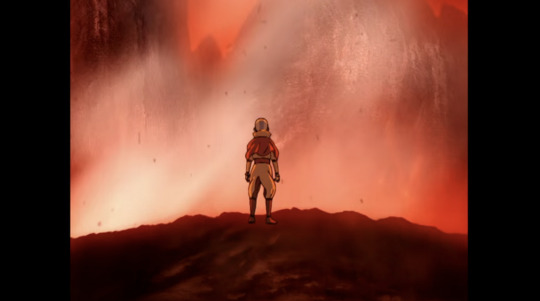
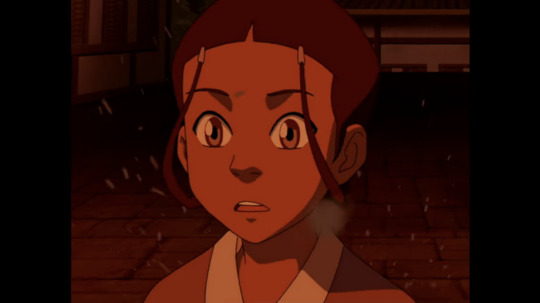
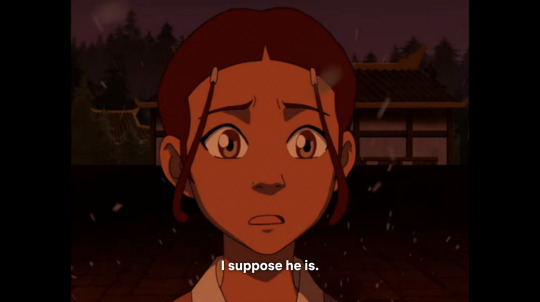
He's not paying attention, he's not trying to impress her. He's just being a good, determined Avatar. A good, helpful person. A powerful bender, completely in control of himself and his element. Being himself.
Her Aang.
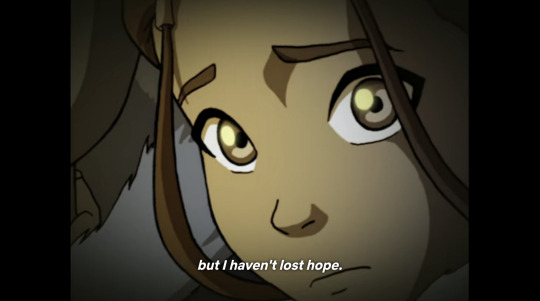
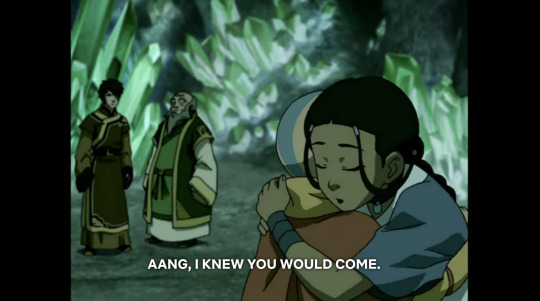
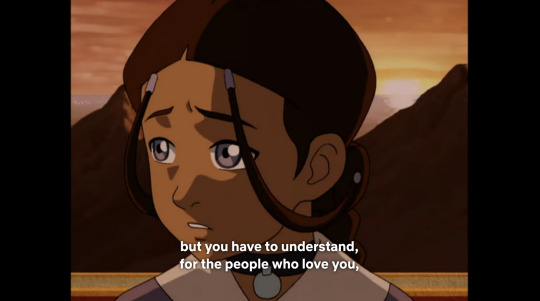
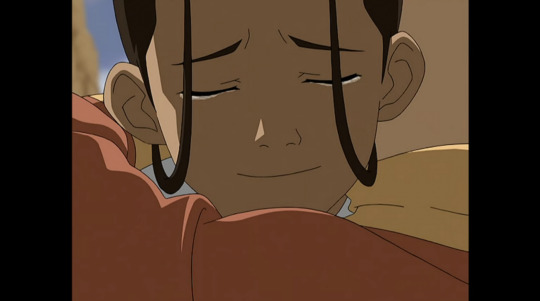
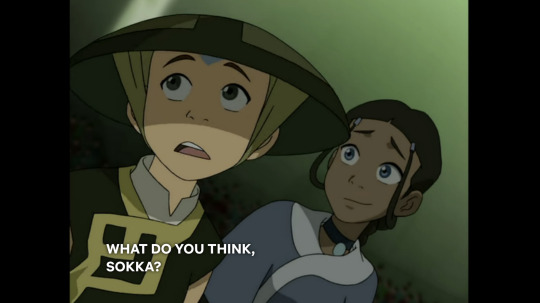
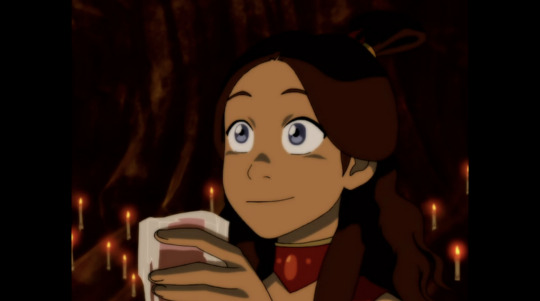
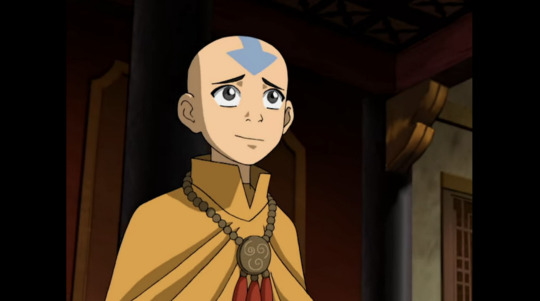
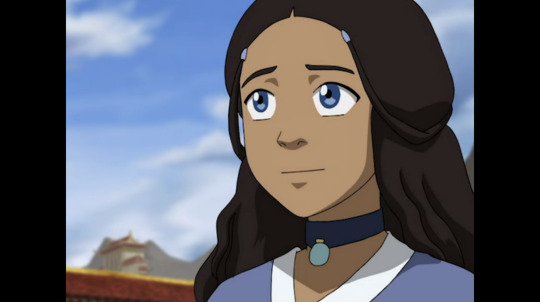
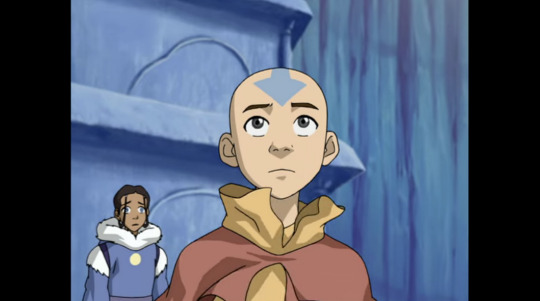
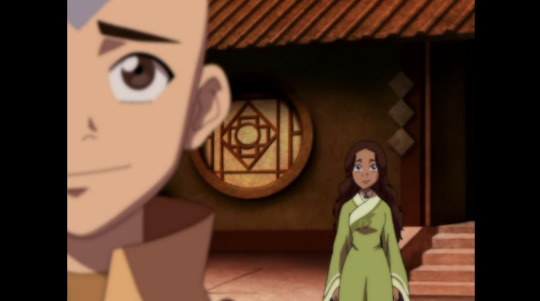
#atla#kataang#aanglove#pro kataang#like she always would've fallen for him just by proxy of aang being himself. it was Inevitable#otp: penguin sledding#been thinking about how much shipping revolves around ideas of 'understanding' and a desire for authenticity between characters#doesn't get much more authentic than them#atla meta#analysis series#analysis#every so often i get dragged away from my 24/7 rayllum brainrot to think about another ship#cause i was thinking about how much they have the kataang vibe of#'i've seen the best and worst in you and i believe and love you so much' +#reaffirmation of how that person sees you as your likewise best most self actualized self and. yeah
205 notes
·
View notes
Text
Anakin’s love and marriage to Padmé wasn’t the issue of why he fell to the dark side. He was already being groomed by Palpatine in becoming his apprentice, and Padmé not being there wouldn’t have changed that. She just made it easier. Anakin was born a slave, which doesn’t leave him in the right headspace, and ever since Shmi died, Anakin became more unstable. Inevitably, he became more obsessed with control and wanting the power to stop the ones he loves from dying. Had Padmé not been in his life, Anakin still would have fallen due to Palpatine’s manipulations and topped with the Jedi’s mistreatment of Anakin. The Jedi and even OW failed Anakin in a way where Anakin came to a point where he doubts their faith in him, and he in return loses his trust him them. He says so himself in the ROTS novel. None of that had anything to do with Padmé.
But to insinuate that Anakin only cared for gaining “power” and essentially his “greed” is to blame for his actions, is super reductive understanding of his character. Yes, Anakin was greedy for control, and power. But not because he’s power hungry and wants to rule the galaxy. He only ever wanted more power to keep his loved ones safe, to assume control over what happens to him. (and this would’ve happened even if he and Padmé weren’t together.) saying that if Anakin “truly cared about saving his wife”, he would have told OW or any of the masters about his situation but didn’t because he was “greedy” is again, incorrect. Because Anakin DID go to the Jedi for advice. He talked to Yoda. Anakin put his faith into the Jedi but they didn’t exactly lead him down the path he needed.
Doubled with the fact that he knows the Council doesn’t trust him, and him not being sure he can trust them, (yes, including OW.) this led him to seeking answers in other and more dangerous places. Which was Palpatine. Whom Anakin is already vulnerable to and was being groomed by. Anakin’s fall to the darkside was due to his desperation and desire to save his wife, the love of his life. Not because he was greedy for more power and that he didn’t truly care about saving Padmé. That’s just a bad analysis of his character, intentions, and motivations. Anakin only became obsessed with the idea of “gaining power to rule and obtain authority” happened AFTER he fell. And that’s because the darkside plays with your sanity like that, makes you want and do things you normally wouldn’t do or want.
The main point is: Anakin’s fall doesn’t stem from his greed for wanting power because he seeks heroism, status, and authority. It was out of genuine love and desperation for his wife. Then again, his marriage to Padmé also isn’t to blame for his fall, because that was due to Anakin’s own fear of loss and abandonment. He would’ve fallen under any circumstance, with how unstable, vulnerable, and manipulated he was. That was the tragedy. He was always doomed to fall.
#star wars#anidala#anakin skywalker#padmé amidala#meta#anidala study#anakin study#character analysis#i’m gonna do a bigger meta on this with excerpts from the books and comic panels to further drive my point across#i’ll start cooking that up tonight#I’m mainly addressing the crowd that holds anidala’s relationship are the crux of why anakin fell#which isn’t true because anakin was always bound to fall#but i’m also addressing the crowd that insist that anakin fell because he was innately greedy for power and authority…#and not out of true desire and love to save his wife#both takes are false and 100% incorrect
135 notes
·
View notes
Text
Just to put a lot of my posts and beliefs about Light Yagami's character in one post (headcanons not included):
• He does not do anything for purely moral reasons. The reason he started killing criminals was because he was curious, and then afterward his "crusade" was built from panic and spite. He thought using the Death Note was going to kill him, so he decided to take everyone he considered a threat to society down with him—that way he would still be good. He would still be remembered. If he can't live, then criminals don't deserve to either. The weight loss and the insomnia shown in the manga, were more likely results of a fear of dying than moral stress.
• Then Light discovers he won't die. This negates part of the spite, but not the need for a moral justification to keep himself "good". He no longer needs to be a martyr, so instead he's chosen to become a God.
• During this week and half of time, Light goes from being a bored, lonely, listless teenager disgusted with the world because it's not how his father taught him it should be, disgusted because if he can manage perfection why can't the rest of the world—to a boy with a new friend and a new mission that gives him purpose. Something interesting. If the world can't be perfect on its own, he'll have to help it. The world needs his help, making him its "savior".
• In comes L. It is no longer about Kira, no longer about saving the world from itself, even if he might tell himself it is—it's about the game. Kira was a fun pastime, yes, but L has made things so much more interesting. (Light and Ryuk are actually wildly similar in several ways it's just not immediately obvious). This game is more fun, too, because this time he has an opponent—one not so nebulous as "the criminals of the world", who offered no challenge. Light is still justifying his actions through a lens of morality, because he has to, but they're beginning to run rather thin.
• Both the broadcast and the obvious taunts to L through changing Kira's killing methods supports the above. "You're too stupid, L. If you were just a little smarter, we could've had some fun." Drawing L in was to progress their game, not Kira's goals. If Light truly only cared about Kira's vision, Kira's new world, Kira's righteous justice; then he wouldn't have continued to play the game after the broadcast. There was no way for L to find him without Light drawing him in—the Death Note is literally the perfect murder weapon. Light knew this, he just ignored it because he wanted to play.
• In the same vein: Yotsuba Light doesn't know he's playing the game. He's forgotten that there even is a game, and so he sees L as someone who's been duped, who either isn't as intelligent as he's been made out to seem, or someone who's being purposefully cruel just because he can. Either way, to Yotsuba Light, L's threat level has only increased, because Light no longer has any sort of weapon to go against him with. He can't even wield his own innocence against him, because his innocence is not certain. Even to himself. Yotsuba Light knows that he has to play along with L's plays of friendship and morality in order to secure his freedom, but he does not respect L or like him. At least, not until near the end, where they're closing in on Higuchi. Where his freedom seems closer....and yet he sees his own, true innocence as more tenuous than ever. Notably, even when Light feels positively towards L there, he still does not share his suspicions about himself with him. His own life still takes precedence over any sort of justice or morality he might have, because Yotsuba Light is still Light. And Light will always put his own self-interests first.
• After killing L, something interesting happens. Because the game ends, but Kira is still left. And Light was willing to take risks and make wild plans in his game with L, but Kira's goals always, always came after his own life. And when only Kira's goals are left, Light stops taking those big, potentially lethal risks. (i.e. bomb desk trap, killing Raye Penber in person by handing him pages of the Death Note, killing Naomi Misora in person right in front of the police station, writing Higuchi's name while sitting right beside L with the murder weapon literally in his hand, etc. etc.). Winning the game was worth dying for—Kira's ideals are not. Or, to put it even more simply: His pride is worth dying for, but his morals are not. Five years after his victory against L, he's presented with another game, but instead of feeling fearful and excited as he did with L, Light is angry. Arrogant and angry. Because this isn't a game to these opponents, as it was to L—they're playing against each other, and Light is merely a piece in it. This game is not like his game with L; it's more like his "game" with the criminals of the world. One with no true challenge, just another defense of Kira's world—worth winning, but not worth dying for.
• Light's pride is more important to him than anything. He needs to be able to take pride in himself and his actions. Pride comes before everything else, before Kira, before family, before L, even before his own desires and physical health. He does not enjoy killing—he just turned it into something he could be proud of. Into another mastering of craft. Light is not particularly sadistic, he's just spiteful. He'll only take pleasure in someone's suffering if they make someone else suffer first, especially if that someone is him. Attacking his pride would count as making him suffer, because that's the most important thing in the world to him. Even though Light also values his life incredibly highly, attempting to kill him wouldn't invoke as much hell-hot wrath as attempting to humiliate him would. And Light will always get even. Always. He does not forgive and forget.
• He believes every lie he tells himself. Every. Lie. He is a Good Man. He is Good Son. He is a Savior. He is Better. He is NOT Evil, he is Good. He's incredibly adept at not only fooling other people, but fooling himself. Even if he's vaguely aware of the truth, he'll take great pains to make sure that truth never comes to light—because it would crush him.
• Light does not take his own desires into account. If he likes or wants something that contradicts with the perfect image he's crafted, he purges it from his mind. Makes excuses for why he doesn't need it, or even convinces himself very thoroughly that he didn't even want it in the first place. If it's not something he can be proud of (or convince himself to be proud of), he doesn't allow himself to desire it.
• Light sees everyone as beneath him (family notwithstanding, Light loves his family deeply), and while it's a pyramid scale of how far beneath him they are, it's not actually ranked by things like gender, sexuality, race—it's ranked by morality and intelligence. The more intelligent and moral you are, the higher up you are on the scale. Light feeling hostile towards someone does not always mean he sees them as further down beneath him; with L and Misa specifically, it means that they're a threat. Light tends to only see people near the top of the intelligence pyramid as threats; evidenced by him dismissing Matsuda completely even with the knowledge that Matsuda was a marksmen, and yet him immediately setting out to kill Naomi when he found out she figured out one of Kira's secrets. With Takada and Mikami, he treats them exactly the same as each other because they're both on the same level of the scale—and he didn't hesitate to get rid of either of them. (Or try to get rid of, in Mikami's case). Everyone is either a tool, a threat, a criminal, a citizen, or family to him. People to use (tool, criminal), people to serve and/or placate (citizen, family), and people to eliminate (threat, criminal). Everyone falls into at least one of these categories for him.
• Light Yagami is a tragic character. And he's a tragic character because he refuses to believe he's part of a tragedy. He would rather swallow broken glass than be considered a victim of anything.
#death note#yagami light#light yagami#character analysis?#character analysis#the stapels of his character ✨#i see so many character profiles for him that i thought id make one of my own :D#these are the points of contention for me—ESPECIALLY on the pride bit#if his pride isnt the most important thing to him beyond his life (and sometimes his family) then i consider it an ooc interpretation#but he's also not just. blatantly evil. he doesnt revel in the gore of his victims killing just for kicks#again its not about his own desires so much as its about his need to be seen as perfect and honorable#his intelligence bites him in the ass on that front. bc he can convince himself that his killing is righteous with very little struggle#anyway ✨ i love him#he's so interesting#this is how i see him WITHOUT all my headcanons in the way lmao#bigender light my beloved im sorry this is not your time to shine 😔
245 notes
·
View notes
Text
there was some Twitter madness recently where someone left a comment on someone's art to the effect of, "Ed shouldn't wear a dress, he's a man!" which I do disagree with on principle, but unfortunately, it brought out one of my least favourite trends in the fandom
so, naturally, I had to write a twitter essay about it. and I already largely argued this in a post here, but the thread is clearer and better structured, so I thought I'd cross-post for those not on the Hellsite (derogatory). edited for formatting/structure's sake, since I no longer have to keep to tweet lengths, and incorporating a couple of points other people brought up in the replies
so
I want to point out that the wedding cake toppers in OFMD s2 aren't evidence that Ed wants to wear dresses. Gender is fake, men can wear skirts, play with these dolls how you like, but it's not canon, and that scene especially Doesn't Mean That.
People cite it often: 'He put himself in a dress by painting the bride as himself! It's what he wants!' But that fundamentally misunderstands the scene, and the series' framing of weddings as a whole. I'd argue that Ed paints the figure not from desire, but from self-hatred; it's not what he wants, but what he thinks he should, and has failed to, be.
(Yes, I am slightly biased by my rampant anti-marriage opinions, but bear with me here, because it is relevant to the interpretation of the scene, and season two as a whole.)
The show is not subtle. It keeps telling us that the institution of marriage is a prison that suffocates everyone involved. Ed's parents' cycle of abuse is passed to their son in both the violence he witnesses then enacts on his father, and the self-repression his mother teaches, despite her good intentions ("It's not up to us, is it? It's up to God. ... We're just not those kind of people. We never will be."). Stede and Mary are both oppressed by their arranged marriage, with 1x04 blunty titled Discomfort in a Married State. The Barbados widows revel in their freedom ("We're alive. They're dead. Now is your time").
But even without this context, the particular wedding crashed in 2x01 is COMICALLY evil. The scene is introduced with this speech from the priest:
"The natural condition of humanity is base and vile. It is the obligation of people of standing ... to elevate the common human rabble through the sacred transaction of matrimony."
It's upper class, all-white, and religiously sanctioned. "Vile natural conditions" include queerness, sexual freedom, and family structures outside the cisheteropatriarchal capitalist unit. "The obligation of people of standing" invokes ideas like the white man's burden, innate class hierarchy, religious missions, and conversion therapy. Matrimony is presented as both "sacred" (endorsed by the ruling religious body), and a "transaction" (business performed to transfer property and people-as-property, regardless of their desires), a tool of the oppressive society that pirates escape and destroy. That is where the figurines come from.
When Ed, in a drunk, depressive spiral, paints himself onto the bride, he's not yearning for a pretty dress. He's sort of yearning for a wedding, but that's not framed as positive. What he's doing is projecting himself into an 'ideal' image of marriage because he believes that: a) that's what Stede (and everyone) wants; b) he can never live up to that ideal because he's unlovable and broken (brown, queer, lower-class, violent, abused, etc); c) that's why Stede left. He tries to make himself fit into the social ideal by painting himself onto the closest match - long-haired, partner to Stede/groom, but a demure, white woman, a frozen, porcelain miniature - because, if he could just shrink himself down and squeeze into that box, maybe Stede would love him and he'd live happily ever after. But he can't. So he won't.
The fantasy fails: Ed is morose, turns away from the figurines, then tips them into the sea, a lost cause. He knows he won't ever fulfil that bride's role, but he sees that as a failure in himself, not the role. It's not just that "Stede left, so Ed will never have a dream wedding and might as well die." Stede left when Ed was honest and vulnerable, "proving" what his trauma and depression tell him: there's one image of love (of personhood), and he'll never live up to it because he's fundamentally deficient. So he might as well die.
This hit me from my very first viewing. The scene is devastating, because Ed is wrong, and we know it! He doesn't need to change or reduce himself to fit an image and be accepted (as, eg, Izzy demanded). Stede knows and loves him exactly as he is; it's the main thread and theme of season two!
(@/everyonegetcake suggested that Ed's yearning in these scenes includes his broader desire for the vulnerability and safety Stede offered, literalised through unattainable "fine" things like the status of gentleman in s1, or the figurine's blue dress. I'd argue, though, that these scenes don't incorporate this beyond a general knowledge of Ed's character. Ed is always pining for both literal and emotional softness, but the significance of the figurines specifically, to both Ed and the audience, is poisoned by their origin and context: there is no positive fantasy in the bride figure, only Ed's perceived deficiency.
Further, assuming that a desire for vulnerability necessarily corresponds with an explicit desire for femininity, dresses, etc, kind of contradicts the major themes of the show. OFMD asserts that there is nothing wrong with men assuming femininity (through drag, self-care, nurturing, emotional vulnerability, etc), but also that many of these traits are, in fact, genderless, and should be available to men without affecting their perceived or actual masculinity. It thematically invokes the potential for cross-gender expression in Ed's desires, especially through the transgender echoes in his relieved disposal, then comfortable reincorporation, of the Blackbeard leathers/identity. It's a rich, valuable area of analysis and exploration. But it remains a suggestion, not a canon or on-screen trait.)
Importantly, the groom figure doesn't fit Stede, either. Not just in dress: it's stiff and formal, and marriage nearly killed him. He's shabbier now, yes, but also shedding his privilege and property, embracing his queerness, and trying to take responsibility for his community. In a s1 flashback, Stede hesitantly says, "I thought that, when I did marry, it could be for love," but he would never find love in marriage. Not just because he's gay, but because marriage in OFMD is an oppressive, transactional institution that precludes love altogether. All formal marriages in OFMD are loveless.
So, he becomes a pirate, where they reject society altogether and have matelotages instead. Lucius and Pete's "mateys" ceremony is shot and framed not like a wedding, but as an honest, personal bond, willingly conducted in community (in a circle; no presiding authority, procession, or transaction).
That is how Stede and Ed can find love, companionship, and happiness: by rejecting those figurines and their oppressive exchange of property, overseen by a church that enables colonialism and abuse. Ed is loved, and deserves happiness, as he is, no paint or projection required.
ALL OF THIS IS TO SAY: draw Ed in dresses! Write him getting gender euphoria in skirts! Write trans/nb Ed, draw men being feminine! Gender is fake, the show invites exploration, that's what 'transformative works' means! But please, stop citing the cake toppers as evidence it's canon. Stop citing a scene where a depressed Māori man gets drunk and projects himself onto a rich, white, silent bride because he thinks he's innately unlovable and only people like her can find happiness, shortly before deciding to kill himself, as canon evidence it's what he wants.
(Also, please don't come in here with "lmao we're just having fun," I know, I get it. Unfortunately, I'm an academiapilled researchmaxxer, and some of youse need to remember that the word "canon" has meaning. NOW GO HAVE FUN PUTTING THAT MAN IN A PRETTY DRESS!! 💖💖)
#OFMD#Our Flag Means Death#OFMD Edward Teach#gender stuff#Togas does meta#god this seems even longer as a semi-proper essay XD#I know this is the piss on the poor website of reading comprehension but please god don't misunderstand me#i'm not saying you can't draw ed (or any other male character!) in a dress or that it's The Wrong Interpretation or whatever#I AM saying this fandom sometimes emphasises feminising Ed to the point of over-simplification and dehumanisation#which certainly feels at least racist-adjacent and definitely misses the point of the show#but mostly I'm saying that THAT SCENE DOESN'T MEAN THAT and I wish people would stop talking about it like something sweet and positive#when it's one of the most miserable and heartbreaking scenes in the show. like. agreeing with ed's depression is a bad look...#my experience of trying to do meta in the last year or so has consisted almost entirely of trying to do#specific historicist analysis or textual close readings#and being met with broad political analyses and overall interpretations of character#like mate..... bless you for engaging but. that is not what I'm doing here. XD#shoutout to the couple folks on twt that mentioned Ed's desires generally or an outtake from the scene#neither of which are at all relevant to my point but thank you for your input
100 notes
·
View notes
Text
the darkling says “fine, make me your villain” because he is. what’s not clicking
#shadow and bone#grishaverse#sab#aleksander morozova#the darkling#pro darkling#sab meta#‘he acts like he isn’t the villain’ like yeah I guess if you want to examine it without any deeper analysis#when the statement itself is actually fascinating to put into a narrative context and analyze the means by which certain steadfast roles#are enacted throughout the books#and the larger implications of character want/desire and leading goal vs world state and perceived morality#largely due to prejudice and war time sentiments#as well as the individual harm caused and the way it’s significance becomes questionable when placed in stark contrast#to the broader political and socioeconomic climate#which doesn’t even take into consideration individual character roles and the doylist analysis of their relative functions as ideas#instead of entire personalities with depth#when you give an idealistic character a goal larger than life with a tactical relevance over a moral one#within a story that also centers around a broader goal of ‘saving the world’ as well as personal trauma#and attempt to liken both to the same moral equivalence and significance#then try to pit them against each other#especially when your narratively condemned villain desires more than anything to protect the masses and be loved for it#showing a fascinating level of genre unawareness. yet displaying a relative awareness to the role he has been unwillingly cast as#because he is both at odds with the genre but not with the general moral tone of the story and it's discordant messages#that rely on the pov of a character that fundamentally cannot understand him#because of his place in the story#and cannot understand the world state#because of her place in the story#you are going to get statements like this#sure yes. he ‘says it like he isn’t the villain’#but come on. we can do better
246 notes
·
View notes
Text
Amazing plays from lis bts. Rachel as a teenager in 2010 being absorbed in plays from the early 1900s, is such a dreamy-Cali-kid thing. "Full of imagination", as Chloe says.

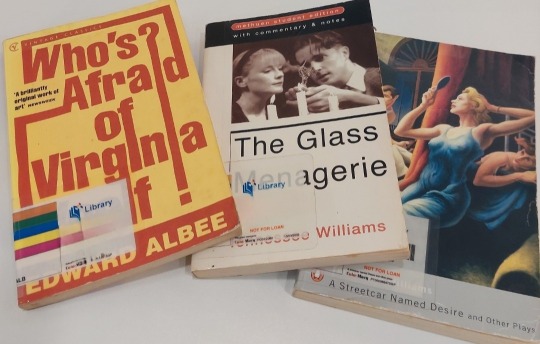
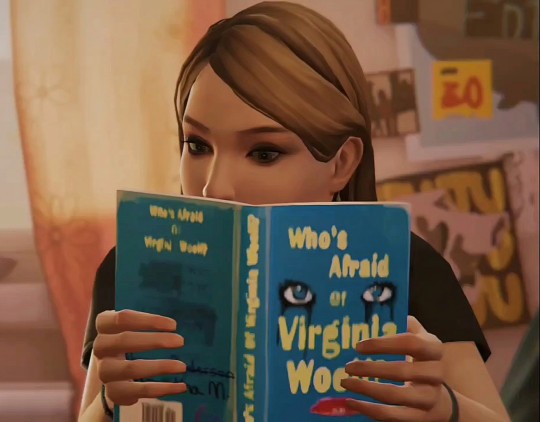
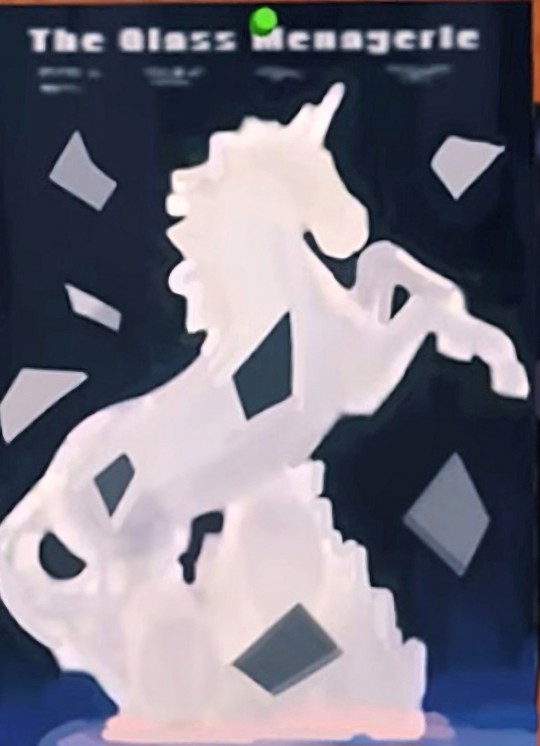
Rachel "delving into the mind of Chloe Price" by reading the book Chloe liked while she waited for Chloe to dye her hair.
Oh Chloe you'll realise Rachel's such a big fan of Tennessee Williams & Shakespeare, she even hangs posters of their plays in her room.
Kiss Me Kate inspired from Shakespeare's The Taming of the Shrew. Some of these giving me 🏳️🌈 vibes
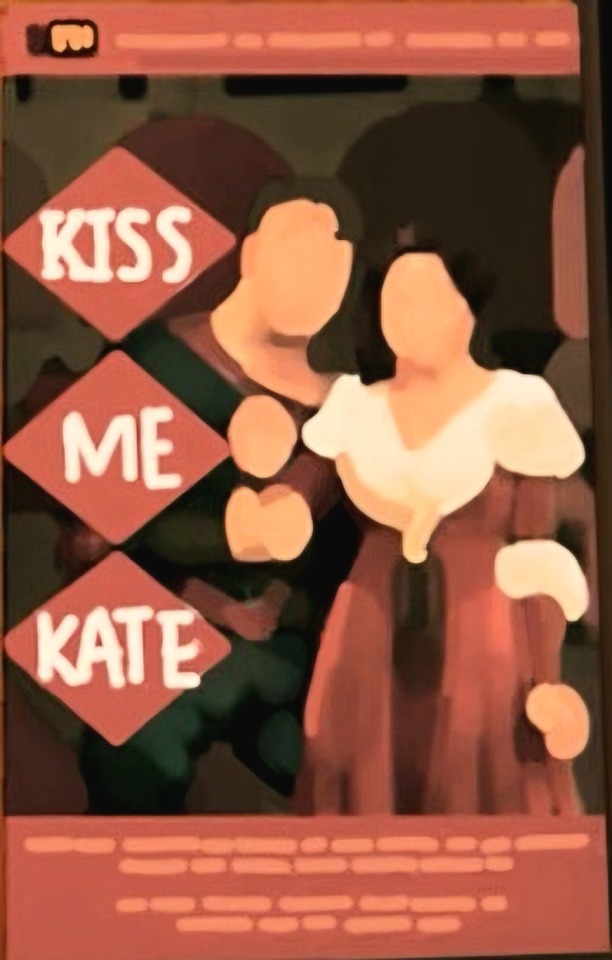
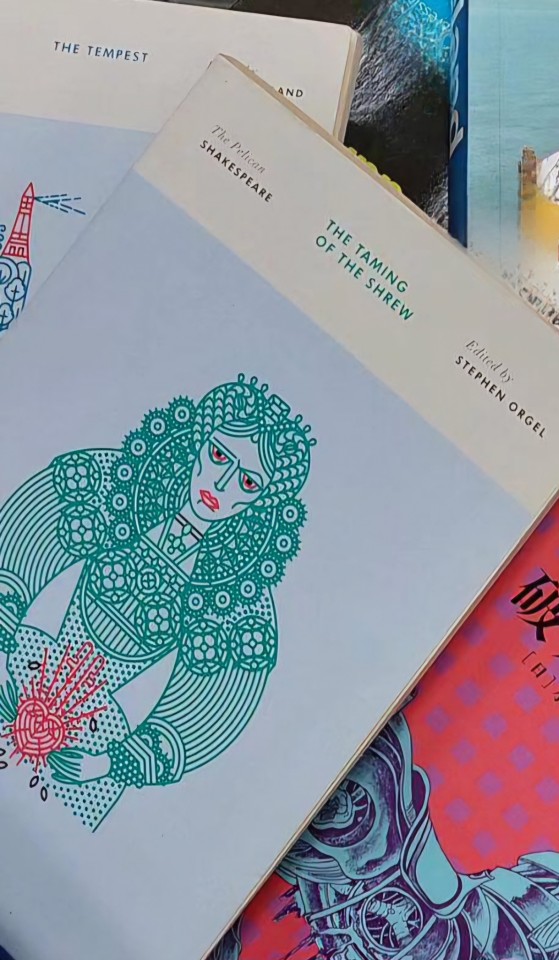
Blanche fits Rachel like a shirt. Imagine her own heartbreaking take on it.

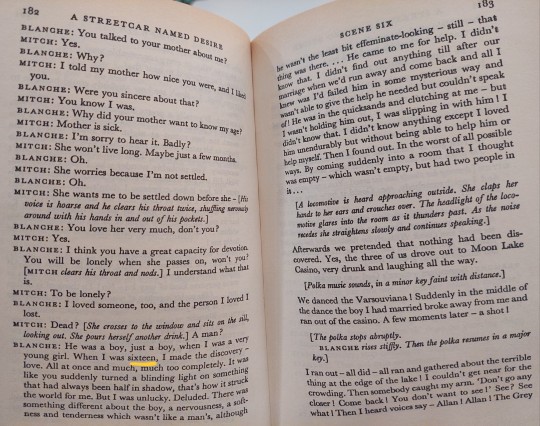
Reading book "recs" from a fandom is such an experience
More to come!
#rachel amber#life is strange#lis bts#life is strange before the storm#lis: bts#plays#tennessee williams#william shakespere#a streetcar named desire#the glass menagerie#amberprice#whos afraid of virginia woolf#drama#theatre#chloe price#lis#rachel amber 4ever#lgbtq+#lgbtq#rachel amber character analysis#rachel dawn amber#dreamy#奇异人生#瑞秋安珀#theatre poster#theatre play#lifeisstrange#lis before the storm#rachelamber#life is strange rachel
67 notes
·
View notes
Note
you're fun to talk to about media so I've got something to ask.
what do you think of this trope where a lie or misconception becomes commonly accepted as truth by the characters in story? especially as a resolution.
example: in the finale of "Kubo and the two strings", the Moon King(main villain) loses his memory, so when he asks who he is, the townspeople lie to him and say he was a kind member of the community, rather than the dictator he really was.
I don't like it. I see a falsehood being widely accepted as a tragedy, and I'm just left imagining what happens if/when the characters find out the truth. I can't really take something as a happy ending when it's.. y'know, fake. I imagine you feel similarly.
but hey, I could have totally missed the point of the ending of KATTS, if you watched it, you might have seen something I didn't.
I haven’t seen Kubo in a really long time; I don’t think I was thinking critically about it the first time I watched it, so my opinion now is an afterthought. I’d have to see it again to be fair!
…But I do seem to remember that the villain is defeated with some importance placed on memory. And the identity of the monkey and that beetle warrior also have to do with the sacredness of memories. So, if that’s the case, then yeah, taking his memory away as a “good resolution” can kind of hamstring the whole theme of the movie. Unless you tilt your head and squint and go, “no, see, if all you have is bad memories, then it’s just as powerful to take those away—the point is, memories have power either way!” But even that feels a little half-baked, gymnastics-brainy.
Basically, I agree with you. A story that resolves with a character, or characters, accepting a lie as truth is always going to be a fumble of the whole story…unless it’s intended to be a tragedy, a cautionary tale. I can think of three where that’s super evident.
1 ) A Streetcar Named Desire
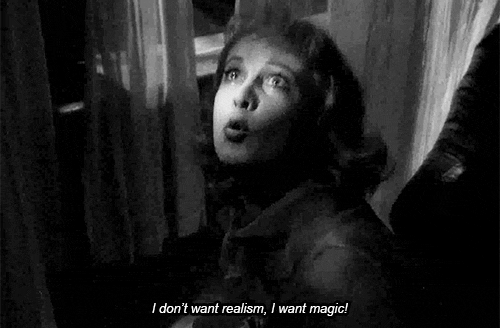
In this movie the main character, Blanche, is lying about who she is, for the whole story. She even has this great symbolism thing with light—she hates bright light, on the surface because she’s vain and doesn’t want anyone to see signs that she’s aging. But under the surface, the character is really an immoral, lust-filled, broken person who knows she can be cruel and isn’t deserving of love. She doesn’t want anyone to know that side of her. She hides it all under vainglory and pride. So she pretends to her sister, Stella, that she’s upright and moral and has simply fallen on hard times. But her sister’s brute of an abusive husband, Stanley, who is always 100% his authentic, awful self, sees through Blanche when she comes to stay with them. In the end, Stanley rapes Blanche and then carelessly shrugs her accusations off.
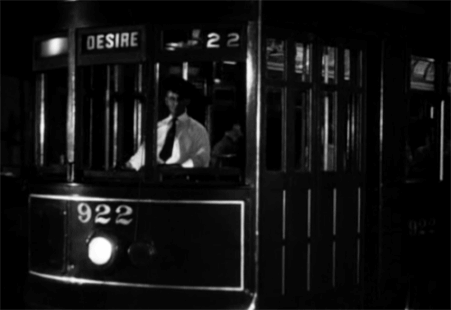
The main point of this example is that Stella, the wife of the rapist Stanley, has been portrayed the whole movie as sometimes-leaving her abusive husband…but only as far as the apartment above their own, literally right above him, so that she can easily go back to him. And at the end of the movie, when Blanche is being taken to a mental institution because she’s broken-down after being found-out as a fraud, then raped, Stella lets them take her away. And then Stella goes up to the apartment above, where she always “pretends” to leave Stanley. It’s such a halfhearted, lazy way to end a movie that’s all about desire-versus-truth. Because what it implies is that Stella is leaving Stanley for now, like she might believe that he raped her sister…but she’ll eventually go back to him. And in the meantime, Blanche goes off to the mental hospital, with this iconic line “I have always depended upon the kindness of strangers.” By which she means, “strangers don’t know what a two-faced monster I really am, so I can con them into thinking I’m a morally-upright woman fallen on hard times, and they’ll take pity on me—so sure, I’ll go with you, strange doctor I’ve never met.”
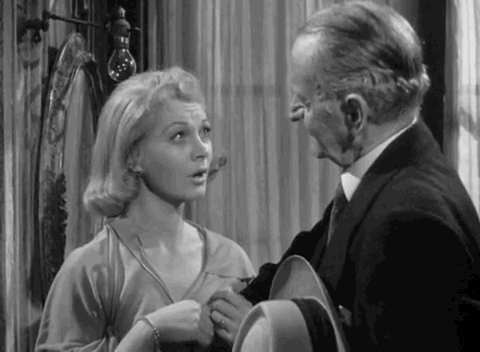
The central point of the movie is “as long as nobody looks the truth in the face, everyone can go on getting what they desire.”
Of course, that’s true. But the other truth is that, if Stella accepted what her sister and her husband really are—her sister is broken and her husband is a monster—then she could choose to rise above “animal desire.” She could choose to take care of Blanche, and Blanche would see that “someone seeing who I really am” doesn’t always have to lead to ruin and damnation. Stella could then, also, choose to really leave Stanley, for good, and be at peace, while Stanley’s “desire” would be rewarded with ruin.
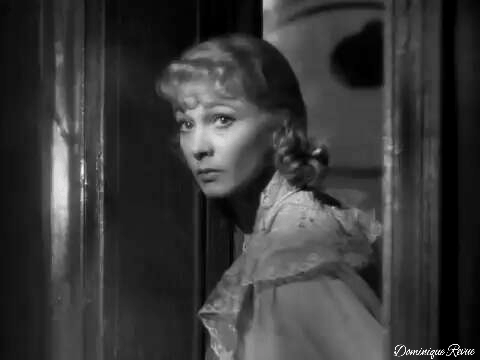
But instead the opposite is what happens. Blanche goes away believing, in her broken mind, that her womanly wiles and faking will protect her from further injury, even though they never have—Stanley ends the movie exactly where he began it, screaming for Stella to come back and knowing that she will—and Stella, too, ends the movie going away from Stanley…just for a little while, until animal desire convinces her to just pretend Stanley isn’t really a monster, Blanche must be crazy, except this time, when she goes back, she’ll be carrying a child into that abusive lie.
All characters wholeheartedly embracing hurtful lies so they can keep riding their desires. I hate that movie. You could see it as a cautionary tale. Most don’t. Most see it as a movie with “hot Marlon Brando” who “really loves Stella—all the characters ‘really love each other,’ they just don’t know how to express it healthily!” 🙄
I think the worst part is that the movie behaves as if it is true that every time Blanche reveals her own brokenness or is vulnerable, the world STOMPS on her for it, nobody loves her despite her brokenness. That’s the real mistake this movie makes. It has an opportunity to show unconditional love and it leaves the audience thinking Blanche was right, and there’s no such THING as “unconditional” love, instead.
Anyway.
2) X-Men Origins: The Wolverine
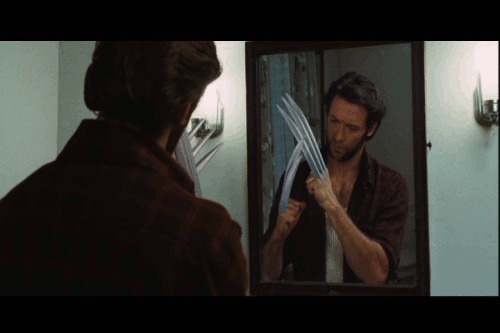
This one is less thematic. But it’s just dumb because the whole movie the main character, Logan, Wolverine, is being taught that “Giving in to Bloodlust Makes You an Animal—Compassion For Those Weaker Than Yourself Makes You Human.”
So in that context, the whole narrative is centered around the exploration of “Who is Logan/Wolverine?”
…Which makes it really stupid that the movie ends with him losing his memory. So…the movie asks “Who Are You?” and right after the character figures it out, he forgets and ends it with the answer: “I don’t know who I am.”
That’s just a waste. That’s silly. It allows you to take the character to real, hearty, coming-of-age, hero-forged-in-fire, a man-born-of-tragedy places…and then just shrug all that stuff off at the end. “Never mind. But it was a fun ride, wasn’t it?”

Especially because they built it all around the dichotomy between Logan and his brother, who’s little more than an animal—and Logan and his wife, who could be an animal, but chooses compassion instead, and reminds him of his choice, too. —and then she dies, and it’s implied that maybe his brother does too, but who cares, cuz he forgets. Who cares? Not Logan. So why should the audience?
I get that they “needed” to do this so that the end of this movie sets up the beginning of the X-Men Movies, which already established that Logan can’t remember “his past.” But like…then don’t make the point of the movie “Who Am I?” just to end on “…Okay, So WHO AM I?”
It’s a fine movie up until that point.
They should’ve made the movie center around “Can’t Change What You’ve Done; But You Can Be Redeemed.” And then show his memory loss around a moment of self-sacrifice. So that it’s still tragic, but at least when he wakes up from the self-sacrificial act, he’s “a new man.” Then later, in the third X-Men movie, when Logan chooses that mutant kid over “learning the secrets of his past,” it all comes full circle, because his “self-sacrifice moment” can stay where the Old Logan died.
Anyway. You didn’t ask me to re-tell X-Men Origins: The Wolverine. But it’s the same basic premise—a movie ends with a character losing their memory, or believing a lie—whatever.
You know, actually, this one isn’t so much “believing a lie” as it is “going back to considering the lie (that he’s an animal) because all the work done to convince him of the truth has been stupidly erased”
3) The Dark Knight
Saved this for last because nobody would read all that if they saw me scratching up the beloved Christopher Nolan Masterpiece.
But The Dark Knight is a perfect example of what you’re actually talking about.
The movie is awesome until the end.

It’s not hard to guess what I’m going to say. Harvey Dent is supposed to be a shining example of a good guy, and the goodness, that Gotham is capable of. The Goodness that will ultimately defeat Evil. And Evil is represented as Chaos.
Bruce sees that and that’s why he’s willing to give everything to make Harvey succeed as the hero Gotham needs. Because if Gotham sees that evil can be conquered by doing things the right way, the orderly way, that will get Gotham out of it’s “Justice is Broken, Vengeance is The Only Form of Justice” cycle.
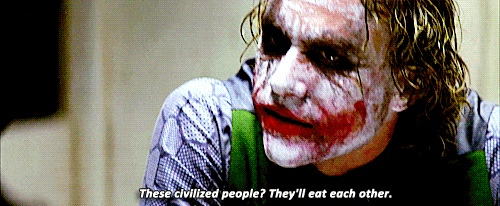
Then there’s the Joker. He doesn’t believe there’s any such thing as Good—it’s all just Chaos (which is evil.) And his big mission is to prove it. It’s ironic that he twists Harvey’s sense of “justice” around to this viewpoint—where Harvey uses “chance” as just another form of “retribution.”
Anyway. All of that’s interesting.
But the movie both perpetuates a lie and does so by having the characters end believing a lie.
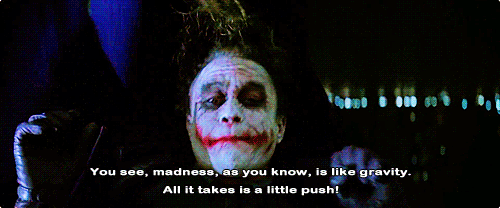
The lie it perpetuates is “The Joker is right, there’s no such thing as Justice or Good—it’s all just chaos, but pretending it’s not can get you through the day.”
That’s the lie it perpetuates!
And how does it do that?
By having the “city of Gotham,” and Bruce himself, believe a lie.

They believe Harvey Dent really was a good guy who died a hero. Bruce believes Rachel died still waiting for him, which symbolized her supposed belief in the good of Bruce and capability of Bruce to let it all go.
And why was it important that they believe those lies? Because the supposed truth is too harsh—that there’s no Good, it’s all Chaos. And if they believe that supposed truth, they’ll all turn out like Harvey or Joker. If Bruce believes Rachel chose Harvey, he’ll supposedly give up on something important in himself.
Okay but the problem with that is you have characters believing a lie because of a truth—that isn’t the truth. It’s the same problem with Streetcar.
The people of Gotham, the worst people of Gotham, aren’t always going to choose evil. There is such a thing as justice and good. And Harvey turning into Two-Face doesn’t change that. The movie could’ve shown that. It started to, with the prisoners on the second boat choosing not to kill the civilians to save themselves.

But it chose not to make that the point of the movie. It chose to make “The Joker was Right, Good is a Comforting Lie, & the Closest You’ll Ever Get to Justice is Vengeance & Chaos” the point of the movie. By having Batman convince the whole city to believe the comforting lie, what you’re saying is, Bruce believes that the truth won’t set Gotham free, only wrap it in chains.
That’s the problem with these movies.
And that’s why I think Captain America: The Winter Soldier licks The Dark Knight hollow every time, and is all-in-all a better movie, hands down. In this continued essay—
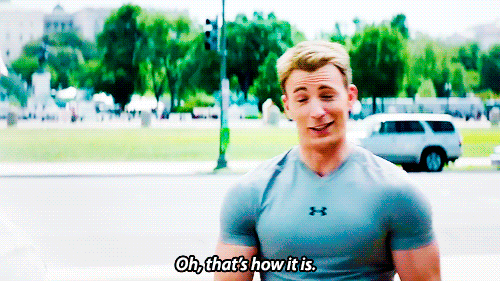
#Asked#answered#the dark knight#the dark knight trilogy#Harvey dent#Bruce Wayne#the joker#joker#heath ledger#movie analysis#tropes#comforting lies#Marlon Brando#Blanche#a streetcar named desire#Logan#x men origins: Wolverine#Wolverine#Hugh Hackman#silver fox#Captain America#media analysis#writing#character analysis#character development#classic film#greatest movies#movies
35 notes
·
View notes
Text
sometimes i think about how the acotar books could've been a great way to show that "love doesn't heal trauma" rather than whatever points sjm was trying to make about abusive relationships and sa. instead of tamlin being abusive, she could've written that feylin's individual traumas kept them from reaching out to each other. or that feyre felt suffocated by the perfect, idyllic and alive spring court when she felt the opposite on the inside. or that tamlin felt overwhelmed by the sudden influx of responsibilities as he's trying to rid himself of the nightmares from utm. they try to make it work. they try to replicate some of the dates and dances from book #1 but there's an almost tangible shadow over their relationship now. and maybe one day feyre sees a memorial for andras or a likeness to one of the high fae living in the spring court to one of the high fae she killed utm, and has a panic attack. and this serves as the catalyst that severs feylin's relationship and reveals that yes, their love broke a curse, their love saved prythian but it couldn't (and shouldn't) heal them.
#im not an analysis girlie i'd much rather rb the smart people in this fandom#but i couldn't stop thinking of this despite sarah's tendency to resolve all of her characters' traumas with dick#no need to retcon or character assassinate my bbgs#feyre could've had a whole plot to herself where she lived outside the bounds of a romantic relationship and discovered her abilities#there could've been reconciliation between her and her sisters (perhaps something that could start her healing)#hell you could even put the feysand mating bond in there and show once again that a magical love bond does not heal trauma#give them a fling that rhysand stops because he knows she's trying to force it so she can feel healed#and its bare minimum but rhys actually sacrificing his desires on page and putting feyre's mental health above them gives him likable#qualities and shows that he truly cares about feyre and this could maybe start his redemption arc#this definitely spiraled but i think it would've been cool#anti sjm#anti acomaf
222 notes
·
View notes
Text
Not to psychoanalyze (Yes, to do that), but given Armand's history, his only preconception of what love is, is to view it through pure desire. Love - and more broadly accurate, his life purpose for like half a millenia - as only he's ever known it, has only been experienced through transactional wish-fulfillment fantasies, of which he was the one typically sought after to complete such an exchange. And so naturally, in his own seeking, he replicates it. Though to some degree he also replicates the fantastical existence of fictional romances to compensate.
This lack of true experience of love without desire or fantasy, making his always unfilled 'objet petit a' - his object of desire - (a partner he desires a particular love from but does not receive to his fulfillment) - the catalyst for believing there is no other form of love to be had. That he can simply love the person, and be altruistic to their personhood, without them filling a role or desire for him, just would never occur. He's egotistical and overly pragmatic towards others by the fault of formative experiences denying him his own personhood. In being groomed into the object of desire, he no longer sees anyone else but as such. It's equal parts lack of self-awareness, meaning he simply has no way to counter-reflect upon himself the way one should behave, and developed coping mechanism, either consciously or unconsciously, taking on the role of those who inflicted upon him their desires to gain a sense of control over it.
In never escaping this cycle of love as desire, he always denies himself his full person, and simultaneously denies the personhood of others.
#tldr: Armand is ten trauma responses in a trench coat#the vampire armand#Armand#character analysis#IWTV#interview with the vampire#lacanian psychoanalysis? In my interview?#I'm NOT an expert by the way this is just for funsies#Also if he does love daniel and yet daniel gives him only the very thing he least desires and yet he still loves him after. That#would be like proof of a love beyond desire.#he might not realize this proof though or perhaps has a great anxiety about it's existence leading to cognitive dissonance#It would be proof as well if for whatever reason despite Daniel having every reason to hate him he does find something to love about him.#I think that kind of confrontation between them could lead towards a confrontation with the possible breaking of this cycle.#beyond daniel as well maintaining normal nonforceful noncommital relationships with others would just help him significantly#and I don’t even bring it up here but Armand falls victim to limerance I feel this involuntary obsessive affection towards someone’s#it’s to such that he values whatever can sustain this obsession more that the object of his obsession themselves#his deep fear of abandonment as only the immortal can bind another immortal to a sense of grounded place to surroundings#something tangibly like constant in a world that always and forever changes#to be abandoned by someone like you would be to be abandoned by the only world you can really know#that is if you need your world to be in relation to others and can’t actually concieve of yourself in it as a full self
27 notes
·
View notes
Text

#also: me every time i check the character tags this week#what is in the water lately#what is with these half baked or fully unbaked jgy (and lxc) takes#'lan xichen was an idiot for believing jgy'#'he's a shitty person who only desires power' cool. cool cool cool.#tl;dr if your analysis doesn't consider the role that fear and filial piety play in jgy's desire for power#then your analysis is also half baked and needs to go back into the oven#mdzs shitposting#he did crimes??? good for him 😌
34 notes
·
View notes
Text
I think one of the most frustrating things about trying to analyze Naruto in any meaningful way is that in so many different ways... it's entirely unclear what it was even trying to say.
I think the best example is the Hyūga. I truly have no fucking clue what the goal was there. What was the intended message? I don't even know what Kishimoto thought he was saying.
And it makes it impossible to understand! It's worse than if the message was just poorly executed, because at least then it would have been executed at all.
#there's a lot of things like this i think#itachi? orochimaru? what was the INTENDED message???#what was the story kishimoto THOUGHT he was doing#at some points it hits so much more like a character proposal than an actual story arc#and like for the record. this post is more out of curiosity than a desire for a snarky post#like i'm genuinely just. befuddled#type: meta#(i guess??? more of a lack of meta i guess LMAO)#fandom: naruto#naruto#naruto shippuden#naruto manga#hyuga clan#neji hyuga#hyuuga neji#naruto analysis#naruto meta
63 notes
·
View notes
Text
the erotics of eating - Dunmeshi [Mithrun & the Demon]
Summary: Mithrun’s dungeon rises from the ashes of Eden. The demon studies the erotics of eating.
Content Warning: implied sexual assault
Desires nestles deep in his chest and the demon coaxes it out with a slow, steady hand. The demon’s hands press against his body, and Mithrun flinches from its cold touch. Prone on his back, Mithrun loses all desire to resist. The goat hovers above him and slowly lowers its mouth near his navel.
Mithrun closes his eyes and forgets how to breathe. The demon devours him, nuzzling its way into his body, his heart. His desires. The carnal way the demon devours his desires makes Mithrun lose all appetite of himself.
The first few moments when the demon penetrates him, it feels like nothing. But a sudden wave of pleasure ripples across his body and immobilizes him—strips his autonomy.
His breath hitches and fingers curl into the soft duvet underneath. Mithrun bites his lip, and his hips roll with intense desire. The demon’s hands—or are they claws?—grip his hips into place and steadies his movements. Mithrun gasps and his mind dims everything except the tremors of ecstasy overwhelming his body.
His feet curl, and his body throbs for release. Mithrun stifles his cry and pleasure, and shame tints his face. He weakly pries at the demon’s hands, but the effort drains his resistance. When he catches the demon’s gaze, it only smiles. The demon’s hands graze over his skin, tracing over his abdomen and murmurs how soft his skin feels and the alluring curve of his neck.
Mithrun loses his voice, and his eyes narrow with tears.
Finally, the demon obliges and motions with its index finger for Mithrun to come.
Like a chalice that overflows, Mithrun trembles and his body quivers violently under the demon.
He doesn’t want it. He wants to tear his body and mind away.
But he can’t resist.
He doesn’t want the demon to violate his sanctuary with perversions.
Mithrun spills over like an ink bottle tipping on its side. His body only reacts to physical stimuli. He’s not enjoying it. It repulses him, he hates it. It’s an act of degradation and control—
“Why do you make that face when consuming you is beyond erotic?”
Mithrun wanders deep in the labyrinth until he notices that the stone below his shoes grow damp. The walls around him become canines. Something is off.
The walls collapse, and
Something wet touches his neck and Mithrun snaps his neck to the ceiling. An unsettling feeling crawls at his chest, but he stubbornly swallows down his fear. He observes the dungeon around him. The air stills, and a faint rumble echoes through the halls.
Mithrun goes up to the wall, tapping his knuckle against it. He raises an eyebrow. His knuckles press against a malleable surface. The wall responds with an unusual squelching noise that only rouses his suspicion of the dungeon.
Specifically, the true form of the dungeon.
Upon closer examination of the stonework, the walls appear as if they’re moving. Pulsating. Mithrun steps back to unclasp his cloak. He activates his teleportation ability, and the cape replaces his hand with something moist.
Moist?
He realizes that the stone floors glisten with water. The ceiling drips water onto his hair and clothes, and he shivers. The walls shake and he realizes that it’s not made of stone but calcium and teeth.
His suspicions slide together like a puzzle and Mithrun only needs to piece together the last part. Mithrun drops his hand to his boot and produces a dagger.
Immediately, he stabs the wall. The walls shake with a silent scream.
The labyrinth collapses when Mithrun shatters the illusion.
#tw sa mention#tw sa implied#cw sa#dunmeshi#dungeon meshi#mithrun dunmeshi#mithrun's demon/goat#it's a bit darker than what i usually write but i was fascinated by a mithrun analysis#drabble is def inspired by that analysis!#fanfic#fanfiction#my fic#i want to do a longer character study on this#there is alot to interprete/unpack in that one scene with **SPOILERS** with the mithrun and the goat demon consuming his desire#spoilers#dunmeshi spoilers#mithrun also experiences dissociation for the second half of the drabble if anyone gets confused
21 notes
·
View notes
Text
I've always found Mari's headspace design interesting.
It's shown in the game that shoes aren't allowed at the picnic blanket for fear of it getting dirty. Everyone has to take them off before going. Even socks have to go. I think it's actually mentioned somewhere, so if I come across the actual dialogue I'll show it, but even without it's still a very clear unspoken rule.
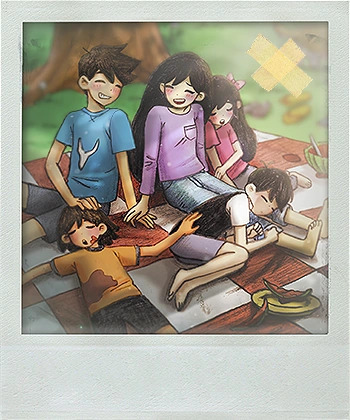
But Mari- who would probably be the biggest advocate for this since it's her picnic- is the ONLY character in headspace wearing shoes. And she's the one constantly at them.
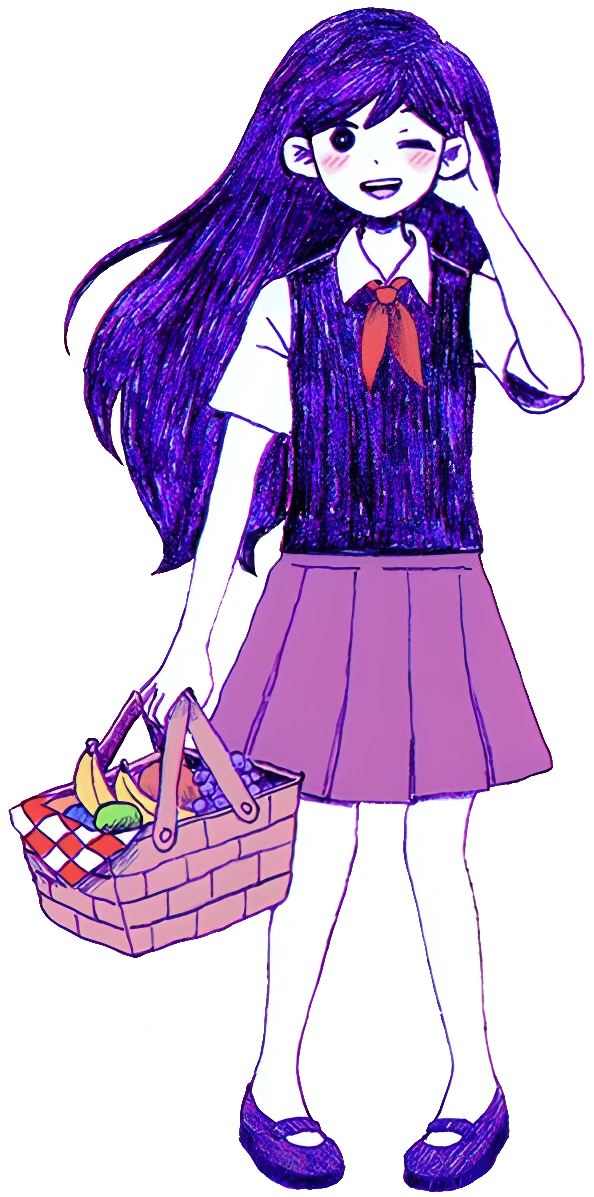
While it's true that in the headspace variants of a few of the photos Mari's barefoot, it's because Sunny is either remembering the memory that way or it's to prove a point (e.g. the feet circle photo where everyone looks the same except OMORI- if Mari were wearing her shoes the impact of this would be lessened immensely and it wouldn't drive home the point of OMORI being vastly different to his friends as hard).
So why is Mari, the one character who's constantly at picnics, where you're not allowed to wear shoes, wearing shoes? It's almost as if she's prepared to leave...


...Oh. She is.
#omori#omori mari#omori analysis#it's literally representing her desire to leave and help sunny instead of feeding into the cycle of headspace guys im not insane trust!!!#every single day i realise something new about mari from the hit game omori#the amount of detail poured into her is insane#no wonder she's my favourite character#PERSONALLY i believe spirit mari and headspace mari are the same entity#headspace mari being the appearance she upholds because omori has given it to her#and spirit mari being the true form of her soul#and the reason it has aged is because it's immortal and it grows unlike anything else in headspace which remains fixed in time#good grief i love her
21 notes
·
View notes